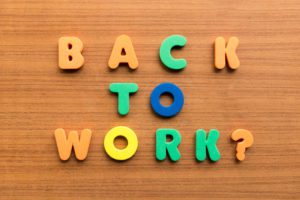 As I’ve mentioned several times and as touted and seen everywhere, there are notable candidate shortages at the moment. In short, there aren’t enough people to fill the job vacancies we have. There are many reasons why this is, but one which has largely been overlooked is quite unique.
As I’ve mentioned several times and as touted and seen everywhere, there are notable candidate shortages at the moment. In short, there aren’t enough people to fill the job vacancies we have. There are many reasons why this is, but one which has largely been overlooked is quite unique.
During the pandemic, larger numbers of previously economically active people left the jobs market. Not because they were forced to do so, but because they chose to. This is particularly true of younger people staying in education for longer (or returning to education) and older people taking early retirement.
However, not everyone is happy with the change. Many are considering if now is a good time to come back into the jobs market, particularly if coming back to work from retirement.
Why work after retirement?
It’s a common phenomenon: retirement looks highly attractive until you get there. The dream and ideals of retirement rarely match the reality. For many, the novelty quickly fades and it’s not the idyllic lifestyle imagined. The lack of structure can be unsettling and the change in purpose can be very difficult to adjust to. This may be particularly true if you’ve retired early, so your pension may not yet be available. Add in the cost of living crisis ensuring no-one’s income goes as far and the shine can definitely come off the retirement plans!
However, if you retired largely due to the pandemic you are far from unique. As of January 2021, over 150,000 people had been pushed into retirement sooner than anticipated. This has contributed to a painful candidate shortage now.
The excellent news is that because of this candidate shortage, now is an ideal time to re-enter the workforce from retirement… if that is what you want to do.
How to get back into the job market after retirement
Before you rush into sending off job applications, first be sure on what drove your desire to retire in the first place and what is driving your desire to return. This isn’t always clear cut. Try to identify what you are missing from your working life as it may be that this won’t be fixed by going back to a similar role.
Many who retire early do so from high-responsibility roles and want to avoid the stress that they experienced which was heightened during the pandemic. It isn’t necessary to return to the same level role as before.
Additionally, money may drive your desire to return. The good news here is that starting salaries have seen notable growth due to the candidate shortage, so you can expect to command a good wage.
Flexibility is a large driving factor too. Office workers worked, on average, 2 hours extra per day when working from home during the pandemic. Working patterns are bedding down into a new normal with a greater mix of hybrid working but with better boundaries for remote workers too.
It is likely that you can secure a more flexible role now than you could during the pandemic. Don’t forget that coming back into the workforce needn’t be on a full-time basis; you may choose to work part-time instead.
Get support with making the right decision
Choose a recruitment agency that will support you as you move back into the labour force after retirement. Seek support coming back to a role that suits you. You can have the best of retirement careers; it just takes a mindset change. At F1rst we are here to help you find the right role.





